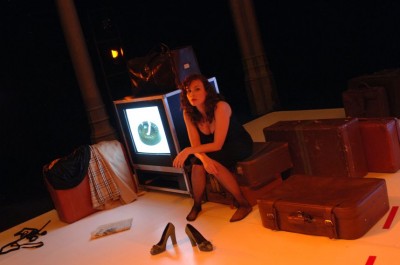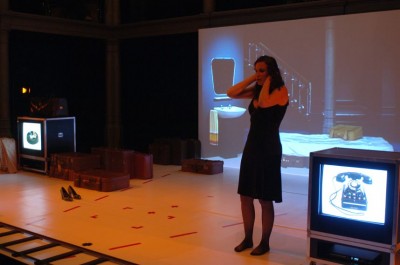Sound of Silence
By Jean Cocteau
Produced by Salomee Speelt and ShPIel Performing Identity
At Theatre Wit, Chicago
Ni le bien qu’on m’a fait, ni le mal
The Sound of Silence was originally conceived as a one-woman tour de force for Edith Piaf in 1940, a time when Europe was mired in the depths of war. Indeed, the play opened mere months before France fell to the Germans. It was in this context that Jean Cocteau and Edith Piaf debuted a one-act about a woman so utterly controlled by a man that she can neither leave him nor kill him. He says not one word, and his silence causes her to expunge everything from herself.
 Noemi Schlosser takes on Piaf’s role in this production. It opens with her simply waiting, watching time crawl by, measured by cigarette butts in the ash tray. She calls a place her husband frequents, looking for him; he’s just left. No, they don’t know where he was going. His sister calls, asking if he’s there in the hotel with her; she lies, says he’s in the bathroom and can’t talk, sorry. Finally he comes home and starts reading his newspaper. It’s after 2am. She asks where he’s been, why he’s so late. He says nothing. We’re never sure if he’s even listening. She pours out everything; she hates him, she’s going to kill him, but then she’d have to kill herself, because she couldn’t live without him. This is a tortured woman. Her husband is having an affair with an ugly old woman, and she can do nothing. She is jealous of the people he dreams about. She is jealous of the people in his dreams; she wakes him up because he looks too content. The self-destruction is almost incomprehensible and yet all-too-human, all-too-possible.
Noemi Schlosser takes on Piaf’s role in this production. It opens with her simply waiting, watching time crawl by, measured by cigarette butts in the ash tray. She calls a place her husband frequents, looking for him; he’s just left. No, they don’t know where he was going. His sister calls, asking if he’s there in the hotel with her; she lies, says he’s in the bathroom and can’t talk, sorry. Finally he comes home and starts reading his newspaper. It’s after 2am. She asks where he’s been, why he’s so late. He says nothing. We’re never sure if he’s even listening. She pours out everything; she hates him, she’s going to kill him, but then she’d have to kill herself, because she couldn’t live without him. This is a tortured woman. Her husband is having an affair with an ugly old woman, and she can do nothing. She is jealous of the people he dreams about. She is jealous of the people in his dreams; she wakes him up because he looks too content. The self-destruction is almost incomprehensible and yet all-too-human, all-too-possible.
 And the production does a great job with the text; the acting, the direction, the sets and costumes and lights. Noemi Schlosser finds all the deep crevices and crannies in this woman’s broken psyche and inhabits them. The set is bare, almost nothing but stage markings; there are two equipment racks with television screens in them, one showing a phone, the other showing images of a clock, dolls with legs swinging, an ash tray. They are at once symbolic and literal. The great projection screen in back shows us the hotel room with Emil (Vitalski, who is at once subtle and devastating), the woman’s husband, reading his paper.
And the production does a great job with the text; the acting, the direction, the sets and costumes and lights. Noemi Schlosser finds all the deep crevices and crannies in this woman’s broken psyche and inhabits them. The set is bare, almost nothing but stage markings; there are two equipment racks with television screens in them, one showing a phone, the other showing images of a clock, dolls with legs swinging, an ash tray. They are at once symbolic and literal. The great projection screen in back shows us the hotel room with Emil (Vitalski, who is at once subtle and devastating), the woman’s husband, reading his paper.
This is a well-put together piece of theatre. It is distinctly modern in its staging, but wholly universal in its storytelling and its appeal. It is certainly a piece that must be talked about at a pub with one’s companions afterwards – because discussion bears great fruit with this play.
Highly Recommended
Will Fink
Reviewed on 11.16
For full show information, visit TheatreInChicago.
At Theater Wit, 1229 W. Belmont, Chicago, IL; call 773-975-8150 or visit www.theaterwit.org; tickets $20; performances Thursdays at 7:30 and Saturdays at 7pm; running time is approximately 90 minutes without intermission; through Dec. 17.

